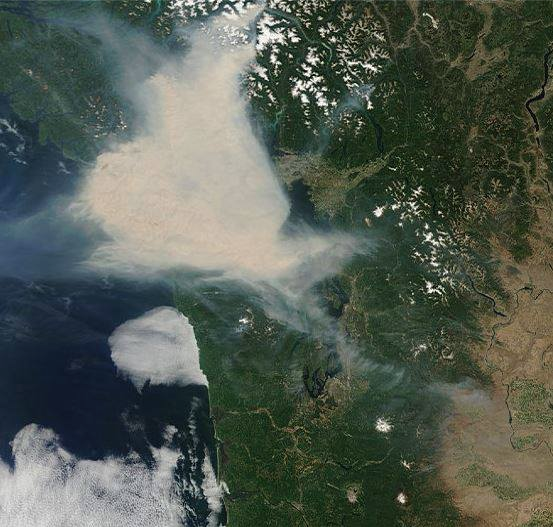Brown Haze… Cough, cough, cough…
July 9th, 2015
 Image Courtesy of the National Weather Service
Image Courtesy of the National Weather Service
Post contributed by Christine St. Pierre
During this incredibly dry, hot summer, brown is the new green for forests, gardens, and fields in the Pacific Northwest. Wildfires are ravaging parts of Canada and patches of Washington state, leaving the whole of the upper left—and other northern parts of the country—choking on its smoke.
Considering the incredible drought and an apocalyptic conflict over water rights in California, it comes as no surprise that Washington, Idaho, Oregon, California, and Western Canada are also experiencing hotter-than-usual temperatures. But, wildfires in the wettest region of the country have many on alert, wondering what this could mean for the future in regards to climate change. Following an unusually dry winter with miniscule snowfall in Washington’s famous ski destination, Mt. Baker, these traveling wildfires are cause for alarm.
In Canada, tens of thousands of acres are burning, from the dry, flat central provinces of Manitoba and Saskatchewan (north of Minnesota and North Dakota) to British Columbia. Currently, urgent evacuations are underway in Saskatchewan. Many U.S. citizens have posted photos of a smoky haze over the Twin Cities of St. Paul and Minneapolis, triggering air quality alerts that urge limitation of outdoor activities, particularly for those affected by smoke or other contaminants in the air, particularly the very young and elderly. In Washington, the smoke has reached as far south as Vancouver, just north of the Oregon border.
According to Canadian officials, nearly 90 wildfires are currently being battled in British Columbia alone, claiming 77 square miles of Whistler, best known for its legendary skiing and snowboarding. In Washington and Oregon, firefighters are working to contain 21 wildfires. The “Paradise Fire” continues to rage on in the Olympic National Park, with many others scattered across the state. Recently, an increase in fires follows Fourth of July fireworks shows, particularly for Lake Whatcom in Bellingham, where a small fire continues its slow march. Spontaneous fires reported along I-5 in the Seattle area are thought to have been caused by cigarette butts.
This summer, do you part in minimizing the potential spread of wildfire in our normally luscious Pacific Northwest. Refrain from using fireworks, setting fires near the wilderness (particularly with dry leaves), and have your vehicles checked for functioning spark arresters before heading into the forests. Now would be a great time to consider cutting the habit of smoking, or get in the habit of throwing your cigarette butts in the garbage. It’s our responsibility to prevent human-caused wildfires! Be sure to report alarming and potentially hazardous behavior to local authorities.
Leave a Reply